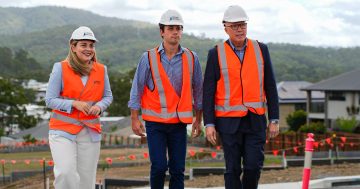Euan Black* says that aspiring home owners need to plan ahead if they hope to save a deposit in these straitened times.

Image: Alexander Stein
If you’re an aspiring home owner, chances are you’re struggling to save a deposit.
The median dwelling prices in Sydney and Melbourne currently sit at $777,693 and $619,383 respectively, according to CoreLogic.
And while affordability improves when you move beyond those cities — with every State capital except Canberra reporting median dwelling prices below $500,000 — interest rates on savings accounts are creeping towards zero, and wages are stagnating.
So how can would-be home owners hope to save a deposit in these straitened times?
Plan ahead
Chronos Private principal adviser, Chris Giaouris said the first thing aspiring home owners should do is come up with a plan.
That doesn’t necessarily mean you need to formulate a strict budget, but at the very least you need to work out how much you can save each month, plus the timeframe in which you want to buy.
That will give you an idea of how much you can spend on a home, and also help you decide whether to invest in shares, or simply shop around for the savings account with the highest interest rate.
“Timeframes are key because if you invest in the stockmarket, for example, history has shown us that there’s no guarantee that investing in shares for three or four years is going to generate a great return for you,” Mr Giaouris said.
Rein in your spending
Next, Investors Choice Mortgages Director, Jane Slack-Smith says you should rein in your spending.
Before you can do that, though, you need to work out exactly where your money is going.
Which is why Ms Slack-Smith recommends tracking your spending first with MoneySmart’s free TrackMySpend program, so you can get a clearer picture of your spending habits.
Once you’ve done that, you can work out where to make cuts — with everything from morning coffees and restaurant visits to streaming subscriptions and pricey gym memberships on the chopping board.
“A lot of people are spending money on gym memberships, and not really going, especially in winter,” said Ms Slack-Smith.
“And there’s fantastic apps like the Nike Training App, which have complete workouts for free.”
“So, do that … and go and get a library membership … rather than spending $30 a month on a book.”
Apart from that, Ms Slack-Smith encourages first-home buyers to adopt a “think-before-you-spend” mindset — something she says is all the more important given the increasing popularity of buy now, pay later services such as AfterPay.
Boost your earnings
Pay rises are hard to come by these days, but Ms Slack-Smith said that shouldn’t stop you asking for one.
Asking your employer for money is the simplest way to increase your income — and a bigger pay packet will not only reduce the time it takes to save a deposit, but also boost your borrowing power.
If your employer doesn’t deliver, though, then consider upskilling by enrolling in a course on online platforms such as Coursera or Lynda, to boost your chances of securing a higher-paid position.
“You’ll find that your local library has a free Lynda account,” Ms Slack-Smith said.
“So ask for a pay rise, or upskill to justify a pay raise.”
“Or pick up extra jobs on AirTasker.”
Hide your savings
Spending less and earning more will help you squirrel away a deposit — and keeping the money under lock and key will protect it from any lapses in willpower.
Which is why Ms Slack-Smith recommends aspiring home owners automate their savings and place them in an account without ATM access.
Consider micro-investing
Investing in shares is often seen as the exclusive preserve of the rich.
But micro-investing apps such as Raiz are changing the conversation, by allowing customers to invest spare change in exchange-traded funds.
Using one of these apps could help you save your deposit much sooner, Mr Giagouris said.
But he cautioned against placing too many eggs in these baskets if you want to buy within five years.
“Two to five years is the most common timeframe for people saving a deposit, and, in my opinion, that’s too short to be investing in the stockmarket,” he said, adding that savings accounts were a safer option.
Take advantage of the First Home Loan Deposit Scheme
Banks often give home loans to first-home buyers with 5 per cent deposits — but such offers are typically subject to buyers shelling out tens of thousands in lenders mortgage insurance (LMI).
However, that won’t be the case for 10,000 first-home buyers next year, with the Morrison Government offering loan guarantees of up to 15 per cent of the purchase price.
The move means first-home buyers won’t need to save as much as they previously planned, Ms Slack-Smith said.
“There’s an incredible opportunity come January 2020 when the Government backs this 95 per cent, no-LMI deal,” she said.
“If you’re buying a $400,000 property and you only need 5 per cent, that’s $20,000.”
* Euan Black is a journalist at The New Daily. He tweets at @euanblackwrites. His website is euanblack.com.
This article first appeared at thenewdaily.com.au.











